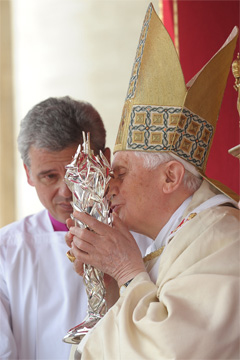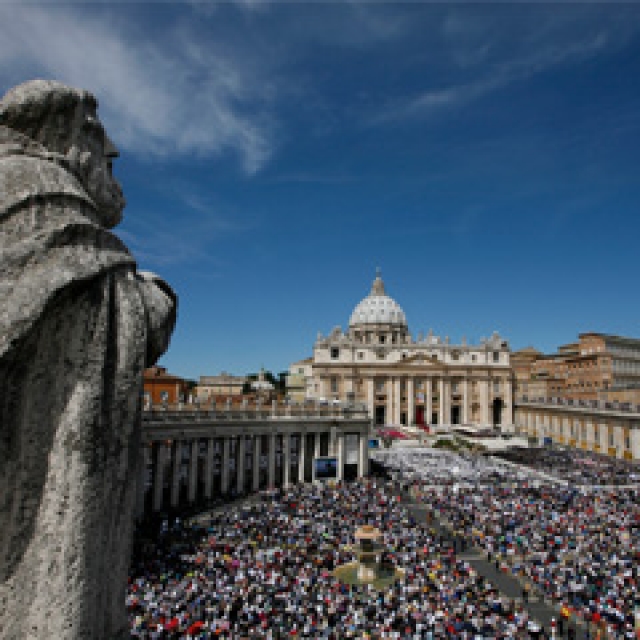"Today his name is added to the host of those whom he proclaimed saints and blesseds during the almost 27 years of his pontificate," the pope said in his homily.
Pope John Paul during his pontificate beatified 1,338 people and canonized 482 -- more than all of his predecessors combined. The beatification of Pope John Paul just six years and a month after his death in 2005 was the fastest beatification in some 500 years.
Pope Benedict said that even at the moment of his death people "perceived the fragrance of his sanctity and in any number of ways God's people showed their veneration for him. For this reason, with all due respect for the church's canonical norms, I wanted his cause of beatification to move forward with reasonable haste."
After the Mass, Pope Benedict went into St. Peter's Basilica and knelt in prayer for four minutes before Blessed John Paul's casket, which was set in front of the main altar. After the pope left, the concelebrating cardinals filed up to the wooden casket, touching it lightly and kissing it.
Eventually, the Vatican opened the basilica to the general public and planned to keep it open either until the faithful stopped coming to pay their respects or until preparations had to be made for the official Mass of thanksgiving for the beatification May 2.
Thousands of people spent a chilly, damp night camped out near the Vatican in an attempt to find a place in St. Peter's Square when the gates were scheduled to open at 5:30 a.m. for the 10 a.m. Mass. The crowds were so large that police began letting people in at 2 a.m., according to news reports.
Thibaut Cappe, a 23-year-old from Paris, got up at 3 a.m. and managed to find a spot half way up the boulevard leading to St. Peter's Square. He said Pope John Paul "is an example of simplicity in the way of being a Catholic. It's not always easy to be a Catholic in our world. He was doing it in a way that was understandable for everyone." Alongside the altar in front of St. Peter's Basilica, priority seating was given to official delegations from more than 80 countries, the European Union and the Palestine Liberation Organization. The United States was represented by Miguel Diaz, the ambassador to the Vatican, and by his predecessors, Francis Rooney and Jim Nicholson. King Albert and Queen Paola of Belgium led the list of royalty present and 16 heads of state attended, including Polish President Bronislaw Komorowski and Robert Mugabe of Zimbabwe.
Alongside the altar in front of St. Peter's Basilica, priority seating was given to official delegations from more than 80 countries, the European Union and the Palestine Liberation Organization. The United States was represented by Miguel Diaz, the ambassador to the Vatican, and by his predecessors, Francis Rooney and Jim Nicholson. King Albert and Queen Paola of Belgium led the list of royalty present and 16 heads of state attended, including Polish President Bronislaw Komorowski and Robert Mugabe of Zimbabwe.
Valeria Buonpastore, who is from Charlotte, N.C., said Pope John Paul "transcended nationalities. He was universal, that's what made him so great. He was loved by people of other nations, religions. A lot of my Protestant friends loved him, too," she said.
Also in the square was Sister Marie Clarice, a 30-year-old member of the Little Servants of the Sacred Heart from Madagascar.
She said she remembers when Pope John Paul came to Madagascar in 1989; she was only 7 or 8, and the image that has remained is of a person who cared about the weak and powerless. "I remember the way he welcomed the poor. He embraced them, like this," she said opening her arms in a wide hug.
Speaking briefly in Polish in his homily, Pope Benedict said of his predecessor: "By his witness of faith, love and apostolic courage, accompanied by great human charisma, this exemplary son of Poland helped believers throughout the world not to be afraid to be called Christian, to belong to the church, to speak of the Gospel.
"In a word: he helped us not to fear the truth, because truth is the guarantee of liberty," the pope said.
Pope Benedict read the formula of beatification at the beginning of the liturgy after Cardinal Agostino Vallini, papal vicar for Rome, petitioned the pope by saying, "I humbly ask Your Holiness to inscribe the venerable servant of God John Paul II, pope, among the number of blesseds."
The pope responded by saying that after consulting many bishops and members of the faithful and after having the Congregation for Saints' Causes study the matter, "the venerable servant of God, John Paul II, pope, henceforth will be called blessed" and his feast will be Oct. 22, the anniversary of the inauguration of his pontificate in 1978.
The crowds burst into sustained applause, many people cried and brass players intoned a fanfare as soon as the pope finished reading the proclamation.
Polish Sister Tobiana Sobodka, who ran Pope John Paul's household, and French Sister Marie Simon-Pierre, whose cure from Parkinson's disease was accepted as the miracle that paved the way for his beatification, carried a relic to Pope Benedict and then to a stand near the altar. The relic was a clear glass vial of Pope John Paul's blood held in a reliquary of silver olive branches.
Reading a brief biography of the late pope, Cardinal Vallini said he "had lived through the tragic experience of two dictatorships" -- Nazism and communism -- "survived an assassination attempt on 13 May 1981 and, in his later years, suffered grave physical hardship due to the progression of his illness. However, his overwhelming optimism, based on his trust in divine providence, drove him to constantly look to the horizons of hope."
In his homily, Pope Benedict also spoke of Pope John Paul's suffering and his battle with Parkinson's disease, which eventually crippled him.
"There was his witness in suffering: the Lord gradually stripped him of everything, yet he remained ever a 'rock,' as Christ desired. His profound humility, grounded in close union with Christ, enabled him to continue to lead the church and to give the world a message which became all the more eloquent as his physical strength declined," the pope said.
Pope Benedict also reminded the crowd of how devoted Pope John Paul was to Mary and to following her example of complete faith.
"Blessed are you, beloved Pope John Paul II, because you believed," the pope prayed at the end of his homily. "Continue, we implore you, to sustain from heaven the faith of God's people."
Contributing to this story were John Thavis and Carol Glatz at the Vatican.
{iarelatednews articleid="5486,5485,5484,5482,5404,5469,5415,5364,5488"}


